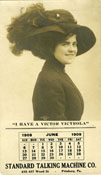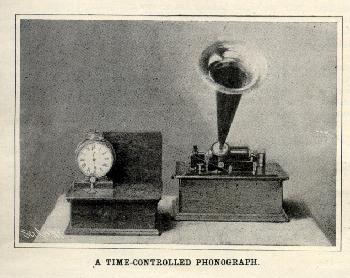On this Day Factola
April 6, 1907
"A Time-Controlled Phonograph," Scientific American, April 6, 1907, p. 289.
.
A recent article referring to the personality of Mr. Andrew Carnegie stated that the great ironmaster is awakened every morning by the melodious strains of a pipe organ, played by a well-known musician, and from a psychological viewpoint of theory and practice this is much better than to be rudely aroused to the day's activity by the clanging gong of a 98-cent alarm clock. Unfortunately all of us cannot afford the luxury of a private organ and organist, but thanks to the genius of Dr. J. E. Hett, of Berlin, Ontario, the next best thing has been done for a sleepy and long-suffering humanity, and that is a time-controlled phonograph, an arrangement of clock and phonograph, so that at any predetermined time of night or day, but especially in the early morning, sweet sounds may fill the sleeper's room and so awaken him.
Now the sounds that are first impressed upon the brain may be a march by Sousa or a song by Melba or any other musical selection that may be desired, and as it is generally believed that the first thoughts which are induced on awakening by external suggestion cling to a person more or less tenaciously throughout the day, it is obvious that these should be sweet and pleasant instead of harsh and uncomforting. To determine the correctness of the above supposition the doctor commenced a series of experiments, and as the result of numerous experiments upon himself he became convinced of the verity of it, and in the end devised the combination shown in the accompanying illustration.
The mechanism is very simple and consists of a spring which trips a lever attached at one end to an ordinary alarm clock, while at the other end a cord which passes over a pulley is connected to the starting lever of the phonograph. The case contains three ordinary dry-cell batteries, and when the alarm lever of the clock is tripped the phonograph is not only started but a miniature four-volt lamp is also turned on and lighted. The light may, however, be turned on or off at pleasure and the phonograph operated likewise at will.
On this Day Factola
.


